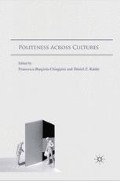Abstract
Very little has been published on linguistic politeness in the Georgian language or culture. Rukhadze (2002) focused on address forms, drawing mainly on the theories of Brown and Levinson (1987) and Scollon and Scollon (2001). She was interested largely in a comparative analysis of face-saving strategies in Georgian and English. Her work, however, has been published only in Georgian and is not accessible to the majority of researchers in the field of politeness research. While Rukhadze was innovative in her analysis of the use of conventional politeness strategies, she did not make use of natural language data in her work. Nevertheless, she points to the crucial significance of in-groups and out-groups as defining concepts in Georgian culture.
Access this chapter
Tax calculation will be finalised at checkout
Purchases are for personal use only
Preview
Unable to display preview. Download preview PDF.
References
Akdogan, P. (2007) ‘A Contrastive Study of the Uchi-soto Relationship in Japanese and Turkish’, Hiroshima Daigaku Daigakuin Kyoukugaku Kenkyuka Kiyoo Bulletin of the Graduate School of Education, Hiroshima University. Part. II, 56, Hiroshima, Japan, Hiroshima University Press, pp. 235–239.
Bousfield, D. (2008) Impoliteness in Interaction, Amsterdam, John Benjamins.
Braun, F. (1988) Terms of Address: Problems of Patterns and Usage in Various Languages and Cultures, Berlin, Mouton de Gruyter.
Brown, P., and Levinson, S.C. (1987) Politeness: Some Universals in Language Usage, Cambridge, Cambridge University Press.
Brown, R., and Ford, M. (1961) ‘Address in American English’, Journal of Abnormal and Social Psychology, 62, pp. 375–385.
Brown, R., and Gilman, A. (1960) ‘The Pronouns of Power and Solidarity’, in T. A. Sebeok (ed.), Style in Language, Cambridge, Cambridge University Press, pp. 253–276.
Culpeper, J. (2005) ‘Impoliteness and Entertainment in the Television Quiz Show: The Weakest Link’, Journal of Politeness Research, 1/1, pp. 35–72.
Culpeper, J., Bousfield, D., and Wichmann, A. (2003) ‘Impoliteness Revisited: With Special Reference to Dynamic and Prosodie Aspects’, Journal of Pragmatics, 1/10, pp. 1545–1579.
de Kadt, E. (1998) ‘The Concept of Face and Its Applicability to the Zula Language’, Journal of Pragmatics, 25, pp. 349–367.
Eelen, G. (2001) A Critique of Politeness Theories, Manchester, St. Jerome.
Goodenough, W.H. (2003) ‘In Pursuit of Culture’, Annual Review of Anthropology, 32, pp. xiv, 1-12.
Harris, S. (2001) ‘Being Politically Impolite: Extending Politeness Theory to Adversarial Political Discourse’, Discourse and Society, 1/4, pp. 451–472.
Harris, S. (2003) ‘Politeness and Power: Making and Responding to “Requests” in Institutional Settings’, Text, 1/1, pp. 27–52.
Harris, S. (2007) ‘Politeness and Power’, in C. Llamas, L. Mullany and P. Stockwell (eds), The Routledge Companion to Sociolinguistics, London, Routledge, pp. 122–129.
Ishikawa, A., Nogata, T., Miyaki, M., Nagao, A., and Iuzuka, H. (1981) ‘Address-Forms in Modern Japanese: A Sociolinguistic Analysis’, Sophia Linguistica, 3, pp. 19–41.
Kamei, Y. (2007) ‘Uchi/Soto and Linguistic Expressions’, KGPS Review, N7, October, pp. 67–80.
Kikvidze, Z. (1999) ‘A Plural or an Honorific? Morpho-syntactic and Sociolinguistic Rules for Their Differentiation’, paper presented at the Symposium ‘Grammatik i fokus’, Lund University, Sweden, 11-12 February.
Makino, S. (1996) Uchi to soto no gengubunkagaku [The Study of Culture of In-Group and Out-Group], Tokyo, ALC.
Mills, S. (2003) Gender and Politeness, Cambridge, Cambridge University Press.
Mills, S. (2011) ‘Discursive Approaches to Politeness and Impoliteness’, in Linguistic Politeness Research Group (LPRG) (ed.), Discursive Approaches to Politeness, Berlin and New York, Mouton de Gruyter.
Nikolaishvili, M. (2000) The Georgian Language, Tbilisi, TSU Publishing House.
Okamoto, S. (2004) ‘Ideology in Linguistic Practice and Analysis: Gender and Politeness in Japanese Revisited’, in S. Okamoto and J. Shibamoto Smith (eds), Japanese Language, Gender, and Ideology, New York, Oxford University Press, pp. 38–56.
Pan, Y. (2000) Politeness in Chinese Face-to-Face Interaction: Advances in Discourse Processes, Stanford, Ablex.
Rukhadze, N. (2002) ‘Face and Politeness While Expressing Solidarity in Present-Day English, Georgian and Russian’, Lingusitic Papers, XII, pp. 221–230 (in Georgian).
Scollon, R., and Scollon, S.W. (2001) Intercultural Communication, Oxford, Blackwell Publishing.
Sukle, R. (1994) ‘UCHI/SOTO: Choices in Directive Speech Acts in Japanese’, in J. Bachnic and C. Quinn (eds), Situated Meaning, Princeton, Princeton University Press, pp. 118–121.
Terkourafi, M. (2005) ‘Beyond the Micro Level in Politeness Research’, Journal of Politeness Research, 1/2, pp. 237–262.
Watts, R. (2003) Politeness, Cambridge, Cambridge University Press.
Editor information
Editors and Affiliations
Copyright information
© 2011 Manana Rusieshvili
About this chapter
Cite this chapter
Rusieshvili, M. (2011). Modes of Address Between Female Staff in Georgian Professional Discourse: Medical and Academic Contexts. In: Bargiela-Chiappini, F., Kádár, D.Z. (eds) Politeness Across Cultures. Palgrave Macmillan, London. https://doi.org/10.1057/9780230305939_8
Download citation
DOI: https://doi.org/10.1057/9780230305939_8
Publisher Name: Palgrave Macmillan, London
Print ISBN: 978-1-349-31456-0
Online ISBN: 978-0-230-30593-9
eBook Packages: Palgrave Language & Linguistics CollectionEducation (R0)

